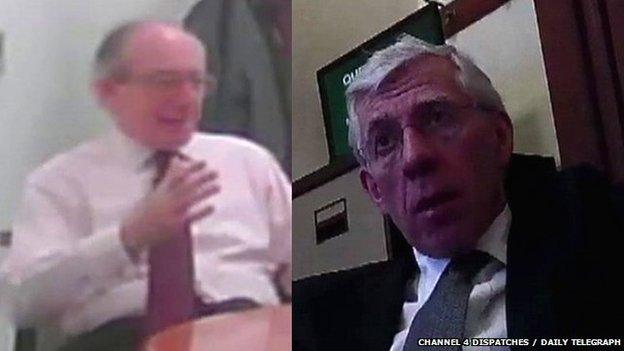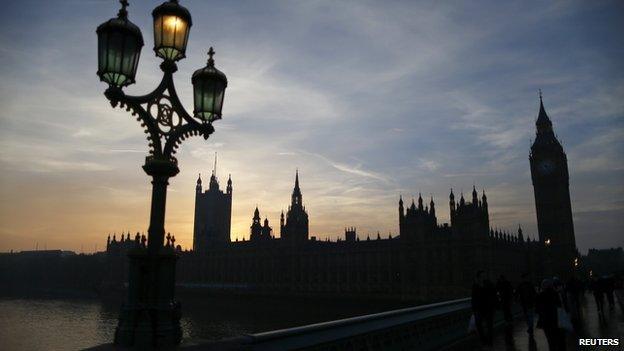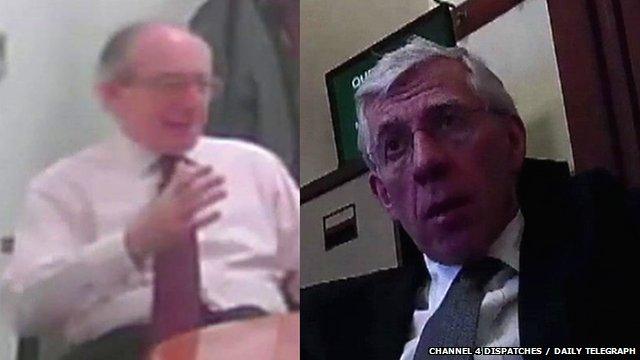MPs' second jobs: What are the rules?
- Published

The debate over MPs and second jobs has been reignited after former Foreign Secretaries Jack Straw and Sir Malcolm Rifkind were secretly filmed apparently offering their services to a private company for thousands of pounds.
Both MPs say they have broken no rules and have referred themselves to the Commissioner for Parliamentary Standards and Sir Malcolm has been suspended from the Conservative group of MPs in Parliament.
What's happened?
Reporters for the Daily Telegraph and Channel 4's Dispatches posed as staff of a fake Chinese firm.
It is claimed that Mr Straw was recorded describing how he operated "under the radar" and had used his influence to change EU rules on behalf of a firm which paid him £60,000 a year.
On the subject of payment, Mr Straw is heard saying: "So normally, if I'm doing a speech or something, it's £5,000 a day, that's what I charge."
Sir Malcolm is reported to have claimed he could arrange "useful access" to every British ambassador in the world.
He is heard saying: "I am self-employed - so nobody pays me a salary. I have to earn my income."

Are MPs allowed second jobs?
There are no rules banning MPs from holding other sources of employment, and many do. Opinion is divided on whether this is a good thing.
For some, having work outside of Parliament means MPs have a broader range of experience and are less likely to be "career politicians".
But critics of the current policy, including Labour leader Ed Miliband, say banning second jobs would increase public trust in politicians.

How does MPs' pay compare?
Public sector pay
2012 parliamentary consultation
£65,738
MP's salary
-
£78,298 Headteacher
-
£72,649 Police superintendent
-
£88,000 Senior civil servant
-
£63,032 NHS director

What are the rules?

The Commons Code of Conduct, external states that MPs must not act as a "paid advocate" - taking payment for speaking in the House, asking a parliamentary question, tabling a motion, introducing a bill or tabling or moving an amendment to a motion or bill or urging colleagues or ministers to do so.
They have to declare their financial interests, including paid employment outside Parliament, in the Register of Members' Financial Interests, external.
There are also guidelines for ministers leaving office: former Cabinet members must normally wait three months after leaving office before they can accept any kind of paid employment, and should not lobby existing ministers on behalf of any organisation for which they are employed for two years after leaving office.

Who enforces the rules?
It is the job of the Parliamentary Commissioner for Standards, external to look into complaints against MPs. The commissioner reports to the Committee on Standards, which then decides on a course of action to take against an MP, including recommending suspension from the Commons, if this is necessary.
MPs vote on whether to implement the recommendations.

Who are Jack Straw and Sir Malcolm Rifkind?
They are both political veterans and former UK foreign secretaries.
Jack Straw, 68, has been Labour MP for Blackburn since 1979. He was a shadow Labour spokesman throughout the 1980s before serving as Home Secretary, from 1997, in Tony Blair's first term as PM, becoming Foreign Secretary from 2001 to 2006 and then holding a series of other front bench roles until Labour lost power in 2010. He is due to step down as an MP in May.
Sir Malcolm Rifkind, 68, was MP for Edinburgh Pentlands from 1974 to 1997 and has been MP for Kensington and Chelsea/Kensington since 2005. He was on the Conservative frontbench from 1975 to 1997, including spells as transport, defence and, from 1995 to 1997, foreign secretary. He is currently chairman of the Intelligence and Security Committee, which oversees the UK's intelligence agencies.

How have Jack Straw and Sir Malcolm Rifkind responded?
Both MPs have said they have not broken any of the rules governing MPs' outside interests.
Mr Straw, the Labour MP for Blackburn, said he had been discussing options for when he leaves Parliament after May's general election. He said he had followed the letter and the spirit of the rules, saying he did not agree with Mr Miliband's call to change the law.
Sir Malcolm, the Conservative MP for Kensington who chairs Parliament's Intelligence and Security Committee, said he had never accepted an offer from the fake firm, saying it was a "preliminary" discussion "about what they had mind".
He said he had "nothing to be embarrassed about". He said the allegations were "unfounded" and he vowed to fight them "with all my strength".
- Published23 February 2015
